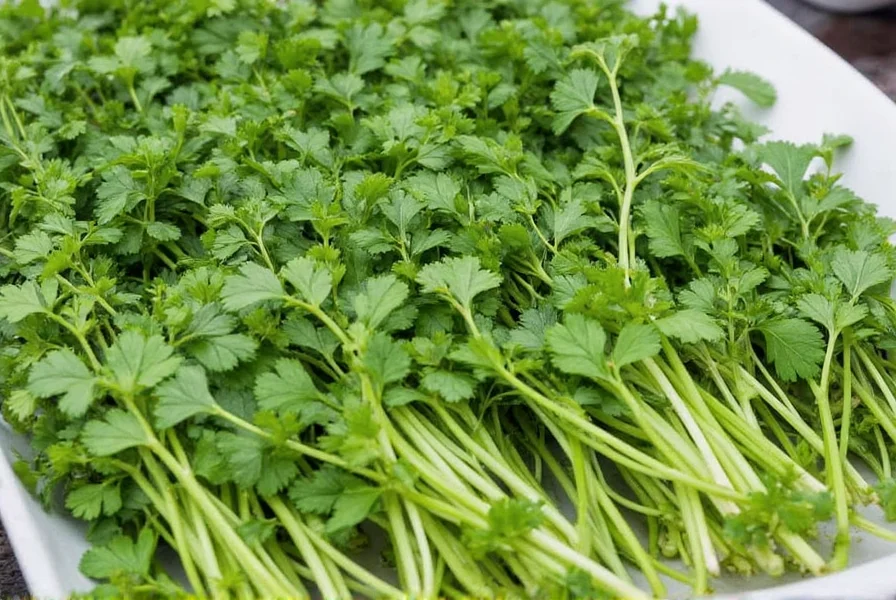Table of Contents
Coriander vs Cilantro: Key Differences
Coriander and cilantro come from the same plant (Coriandrum sativum), but the naming varies by region and part used. In the United States, "cilantro" refers to the fresh leaves and stems, while "coriander" typically means the dried seeds. In the UK, Canada, Australia, and most of Europe, the leaves are called "coriander" and the seeds are "coriander seeds." This regional confusion often leads to miscommunication in recipes. Organic versions of both ensure no synthetic pesticides or fertilizers were used during cultivation, preserving natural flavor and safety.
Why Choose Organic Coriander?
Organic coriander (or cilantro) offers significant advantages over conventional varieties. Studies show organic herbs contain up to 20% higher antioxidant levels, including quercetin and kaempferol, which support immune function and reduce inflammation. Crucially, organic farming eliminates pesticide residues—conventional coriander often tests positive for multiple synthetic chemicals like imidacloprid and chlorpyrifos, which are linked to health risks. Additionally, organic cultivation improves soil health and biodiversity, making it an eco-friendly choice.
| Nutrient | Amount per 100g (Organic) | Amount per 100g (Conventional) |
|---|---|---|
| Vitamin C | 30 mg | 25 mg |
| Vitamin K | 150 mcg | 120 mcg |
| Antioxidants (Quercetin) | High levels | Lower levels |
| Pesticide Residues | None detected | Up to 3 types detected |
Storage and Freshness Tips
Proper storage maximizes the shelf life and flavor of organic coriander:
- Fresh leaves: Wrap stems in a damp paper towel, place in an airtight container, and refrigerate. For longer freshness, store like cut flowers: place stems in a glass of water (cover loosely with a plastic bag). This extends life to 10-14 days.
- Dried seeds: Keep in a dark, cool place in an airtight glass jar. Avoid heat exposure to preserve volatile oils.
- Freezing option: Chop fresh leaves, mix with a little water or olive oil, and freeze in ice cube trays for easy use in soups or sauces.
How to Buy Authentic Organic Coriander
Ensure you're getting genuine organic coriander by checking these criteria:
- Certifications: Look for USDA Organic, EU Organic, or equivalent seals. These guarantee third-party verification of organic practices.
- Visual inspection: Fresh leaves should be vibrant green with no yellowing or wilting. Seeds should be uniform in color (light brown) and free from debris.
- Source transparency: Reputable brands like Green Valley Farms (seeds) or Sun Valley Herbs (fresh) provide traceable sourcing information on their websites.
- Where to buy: For fresh coriander, visit farmers' markets or stores like Whole Foods. For seeds, trusted online retailers include Thrive Market and Amazon Fresh (search for "USDA Organic certified").
Culinary Applications by Region
Organic coriander enhances dishes differently across global cuisines:
- Mexican/South American: Use fresh leaves in salsas, guacamole, and tacos for bright, citrusy notes. Avoid cooking to preserve flavor.
- Indian: Ground seeds are essential in garam masala and curry powders. Fresh leaves garnish dal and chutneys.
- Middle Eastern: Add fresh leaves to tabbouleh, hummus, and shawarma for herbaceous depth.
- European: Use dried seeds in pickling brines or bread dough for subtle warmth.
Frequently Asked Questions
Is there a difference between organic coriander and regular coriander?
Yes. Organic coriander is grown without synthetic pesticides, herbicides, or GMOs, while conventional varieties often contain chemical residues. Organic versions also typically have higher antioxidant levels and better soil health impact. Always check for certified organic labels to verify.
Can I trust "natural" labeled coriander as organic?
No. "Natural" is not a regulated term and doesn't guarantee organic standards. Only certified organic labels (e.g., USDA Organic) ensure compliance with strict farming regulations. Non-certified products may still contain synthetic chemicals.
Why does the name change between regions?
The naming difference stems from historical language evolution. In the U.S., the term "cilantro" (from Spanish) became common for fresh leaves to distinguish them from seeds. Elsewhere, "coriander" refers to the whole plant. This is purely semantic—both terms describe the same species, Coriandrum sativum.
How do I know if my coriander is truly organic?
Check for official certification seals on packaging. For fresh produce at farmers' markets, ask vendors for their organic certification documents. Organic coriander may show minor insect damage or color variations—this is normal and indicates no pesticides were used.











 浙公网安备
33010002000092号
浙公网安备
33010002000092号 浙B2-20120091-4
浙B2-20120091-4